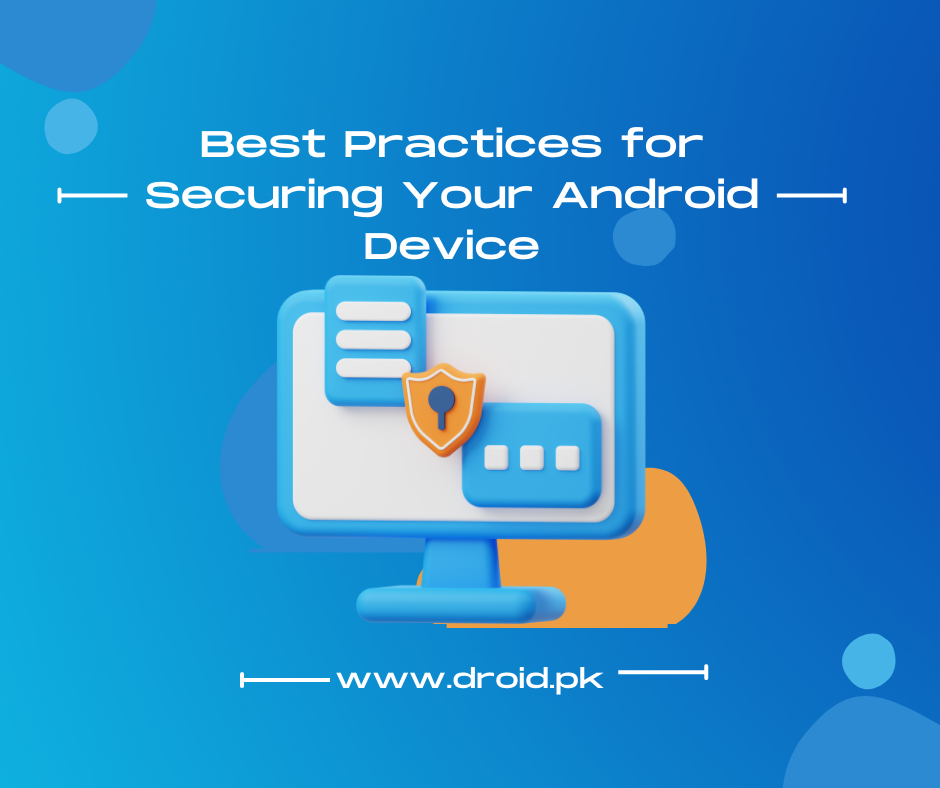
Best Practices for Securing Your Android Device.
Share
In today's digital landscape, securing your Android device is of utmost importance to protect your personal information and maintain your privacy. With cyber threats becoming more sophisticated, implementing best practices for device security is essential. In this article, we will explore the top strategies and practices to secure your Android device effectively. By following these guidelines, you can ensure the safety of your data and enjoy a worry-free mobile experience.
Keep Your Device Up to Date
Regular System Updates
Keeping your Android device up to date with the latest system updates is crucial for maintaining security. System updates often include security patches that address vulnerabilities and strengthen the device's defenses against emerging threats.
Automatic Updates
Enabling automatic updates ensures that your device receives the latest security patches and bug fixes without manual intervention. This feature provides convenience and peace of mind, as your device stays protected automatically.
Use Strong Lock Screen Protection
PIN, Password, or Pattern Lock
Implementing a strong lock screen protection method, such as a PIN, password, or pattern lock, is vital for preventing unauthorized access to your device. Choose a combination that is unique and not easily guessable.
Biometric Authentication
Leveraging biometric authentication, such as fingerprint scanning or facial recognition, provides an additional layer of security to your lock screen. These methods utilize unique biometric data to verify your identity and grant access to the device.
Install Apps from Trusted Sources
Official App Stores
Downloading apps from trusted sources, such as the Google Play Store, significantly reduces the risk of installing malicious or compromised apps. Official app stores have robust security measures in place to detect and remove potentially harmful applications.
App Reviews and Ratings
Before downloading an app, check its reviews and ratings to get insights into the experiences of other users. High ratings and positive reviews indicate that the app is trustworthy and reliable.
Be Cautious with App Permissions
Review App Permissions
When installing an app, carefully review the permissions it requests. Consider whether the permissions align with the app's functionality and your expectations. Avoid granting unnecessary permissions that could compromise your privacy or security.
Grant Permissions on a Need-to-Know Basis
Only grant app permissions that are essential for the app's functionality. Be mindful of granting sensitive permissions, such as accessing your location or camera, to apps that don't explicitly require them.
Enable Device Encryption
Encrypting Device Data
Enabling device encryption protects your data from unauthorized access in case your device falls into the wrong hands. Encryption scrambles your data, making it unreadable without the correct decryption key.
Use Strong Passwords or PINs
When setting up device encryption, choose a strong password or PIN. Avoid using easily guessable information and opt for a combination of letters, numbers, and special characters to enhance the security of your encryption key.
FAQs
-
Q: Are system updates necessary for device security?
- Yes, system updates are crucial for device security. They include important security patches that address vulnerabilities and protect your device against emerging threats.
-
Q: Can I install apps from sources other than the Google Play Store?
- Yes, Android allows you to install apps from third-party sources. However, it's important to exercise caution and only download apps from trusted sources to mitigate the risk of installing malicious software.
-
Q: Can apps misuse the permissions granted to them?
- While rare, it is possible for apps to misuse permissions. That's why it's important to review app permissions carefully and only grant the necessary permissions for an app's intended functionality.
-
Q: What should I do if I lose my Android device?
- If you lose your Android device, you should use the Find My Device feature or contact your service provider to track and secure your device. You may also consider remote wiping your device to protect your data.
-
Q: Is it safe to use public Wi-Fi networks on my Android device?
- Public Wi-Fi networks can pose security risks. To stay safe, avoid accessing sensitive information or making financial transactions when connected to public Wi-Fi. Instead, use a virtual private network (VPN) for added security.
-
Q: Can I install antivirus apps on my Android device?
- While Android devices already have built-in security features, installing reputable antivirus apps can provide an additional layer of protection against malware and other threats.
Conclusion
Securing your Android device is essential to protect your personal information and maintain your privacy in today's digital world. By following the best practices outlined in this article, such as keeping your device up to date, using strong lock screen protection, installing apps from trusted sources, being cautious with app permissions, and enabling device encryption, you can significantly enhance the security of your Android device. Stay vigilant, practice good digital hygiene, and enjoy a safe and secure mobile experience.

